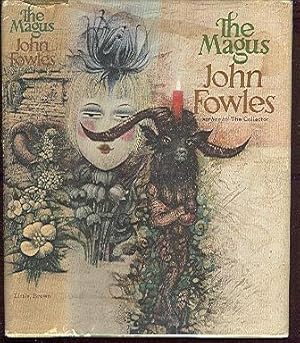

Fowles is nothing if not a literary spell-binder, possessing-like Conchis, the Magus, who despises novels-a bottomless bag of tricks. But illusion it most surely is, especially because Mr. Grand Meaulnes," Alain-Fournier's novel, which "for some of us, at any rate" provided an experience "beyond the literary." We may gather that many enthusiastic readers of "The Magus" over the lastĭecade have operated under a similar illusion. (Although "The Collector" was published in 1963, he had begun work on "The Magus" in the early 1950's.) Mr. Yet it is a remarkable tour de force, and not just as a promising writer's first novel. Or annoyed by the speculation and argumentation in "Daniel Martin" will not find any more to their tastes the intellectual content of the revised "Magus." Those who, unlike this reader, were bored Fowles went on about so solemnly in so many aphorisms for so long.

And the same big, un-English ideas are kickingĪround: Hazard, Freedom, Infinity and those other concepts, which in "The Aristos: A Self-Portrait in Ideas" (1964) Mr. The erotic scenes have been developed and extended, though to no new point of revelation. SentencesĪnd paragraphs have been recast into a generally less sporadic if not clearly superior narrative. Doubtless "The Magus" is too long, but, as with the recent "Daniel Martin," that seems a dull thing to say. Fowles is typically urbaneĪnd disarming, conceding that the most popular of his books is also the one he's been least satisfied with, and that even with this substantial revision it will remain "a novel of adolescence written by a retarded adolescent."Ĭharmed by such modest candor, assured by its author that his book has no more "significance" than a Rorschach test-which at least for this reader means no significance at all-we begin to read, doubting that it can be as callowĪfter arising some days later from finishing the novel, one feels-as is usually the case in reading Fowles-ambivalent. We are used to the frequent changes made by an Auden or a Lowell in the text of their poems īut for a novelist, even 13 years after the event, quite thoroughly to rewrite and republish a large novel that is also a cult book for many younger readers-this is worth some explanation. Not only exceeds the original (1965) by 70-some pages but includes a foreword explaining the "somewhat unusual course" he has taken. Except John Fowles, evidently, because this revised version Hatever one's opinion of "The Magus," no one ever wished it any longer.


 0 kommentar(er)
0 kommentar(er)
